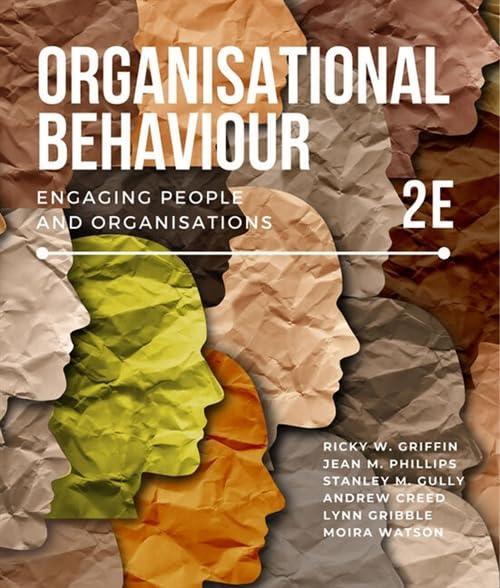From a critical perspective, evidence-based management (EBM) approaches to decision making do not occur in an objective
Question:
From a critical perspective, evidence-based management (EBM) approaches to decision making do not occur in an objective way independent of social or political interests. Instead, evidence is constructed to align with the interests of those who run the organisation, all the while being concealed in scientific language of being neutral, value free and universal.25 From this perspective, decision making occurs based on how the power configurations and political activities of the organisation’s members influence outcomes. EBM seeks to use the most up-to-date information to make organisational decisions. However, the evidence base of most issues is uncertain and controlled by powerful members within the organisation. Information is an important and valued resource, and access to different types of information can increase the influence and power of members. Some members may control the flow of information, restricting access or providing limited interpretations. What information is released may be partial and in line with their own interests. Particular information may be excluded from consideration if it runs counter to the dominant view. EBM is seen as privileging science as the foundation for decision making, which is portrayed as a wholly rational process where self-interests or vested interests are not considered. The role self-regard plays in taking managerial action that conflicts with the evidence is ignored. As an illustration, the findings of research into an initiative to reduce burglary rates differed markedly from the data analysis presented in the later official reports, which promoted the preferred options of decision makers even though they conflicted with the evidence presented by the researchers.26 EBM ignores the role of intuition and its place in innovation and creative problem solving. It undervalues responses not based on rational approaches. A critical perspective sees that rationality and intuition are intertwined and that as managers engage with operational information, they develop intuition.27 Rather than overemphasising rationality and aiming to separate out intuition because it is not scientific, a critical perspective acknowledges that managers frequently rely on intuition when making decisions and see rationality and intuition reinforcing each other.28 EBM is based also on a view that assumes that everyone in an organisation is a member of a team that is working towards a common purpose and that managers are the key decision makers regarding what matters. A critical perspective challenges that view, seeing organisations instead as variegated competing interests with the most powerful determining what counts as evidence and how that evidence can be used in decision making.The critical perspective acknowledges that EBM, like all decision making, is essentially a political act. Each key stage of decision making in EBM involves considerations of power, whether it is the definition of the problem, the nomination of the criteria for inclusion or exclusion of action, how the evidence will be interpreted, or which stakeholders will be involved in the decision and their impact. In this context, to deny the influence of power and politics or to downplay their importance may be seen as naive or deceptive.
Reflection question
Can you think of a time when you have observed decisions being taken based on partial information being made available? Was the excluded information not in line with the decision-maker’s interests?
Step by Step Answer:

Organisational Behaviour Engaging People And Organisations
ISBN: 272389
2nd Edition
Authors: Ricky W. Griffin, Jean M. Phillips, Stanley M. Gully, Andrew Creed, Lynn Gribble, Moira Watson





